They are my mother's family. They were held in bondage in Loudoun county. After emancipation they remained, to till the soil, to birth babies, to build walls and houses - many of which still stand today. They are buried in a quiet cemetery in the woods. Their spirit lives on in me. On this day, as I sit here watching with quiet joy, I see a change in Virginia, which I pray will change America, and change the world.
If you are voting in Virginia today, cast that vote for all those who came before, who never had the chance.
I want to share their stories here today, in hope that their dreams for the future of this land will today come to fruition.
They lived, worked and died in the town of Snickersville, now known as Bluemont, VA in Loudoun County.
My great grandmother Millie Weaver Roberts (short for Amelia)the matriarch of our clan, was a midwife, in slavery and in freedom, as was her mother before her. She was famous for healthy deliveries and healthy mothers, who never died of childbed fever.
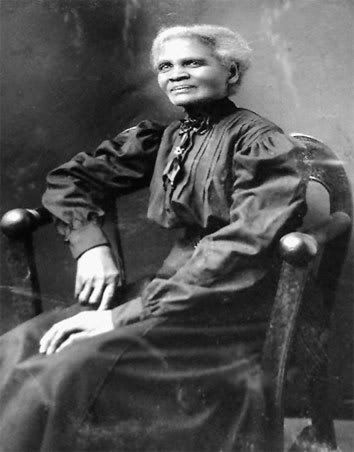
She birthed all of her own children, not allowing anyone else to assist, in fear that they would not practice proper sanitary procedures.
She boiled everything; sheets, and towels, and sterilized her birthing instruments in the oven, at a time when many doctors never even washed their hands before touching a patient. Her clients were both black and white. She passed on her knowledge of herbs and healing to her sons and daughters, and one of her sons went on to become a doctor, another a dentist.
Here is Millie, seated in the chair, in front of a portrait of her deceased husband, Presley Roberts. Presley, a freed slave, a stone mason, had to wait for Emancipation to marry her. If you ever drive through Loudoun county, you will see some of the stone walls, and stone houses he built, which stand till this day.
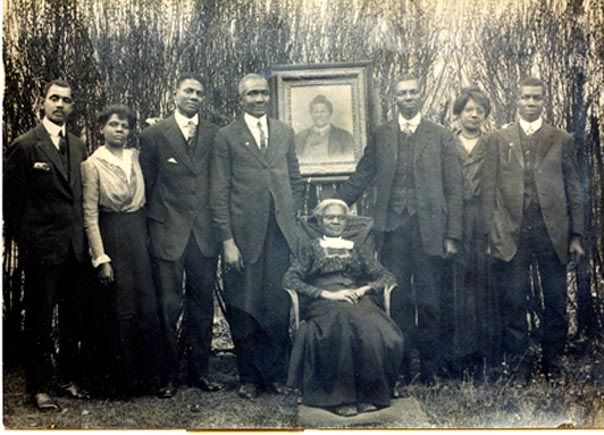
Her seven sons and daughters are beside her. From right to left are Henry, Martha, Joseph, John, James, Hannah and my grandfather Dennis. Dennis graduated from Wayland Seminary (which merged with Virginia Union) in Washington DC in 1897. Aunt Hannah graduated from Virginia Union. The photo below is of her graduating class; Aunt Hannah is in the upper right hand corner:
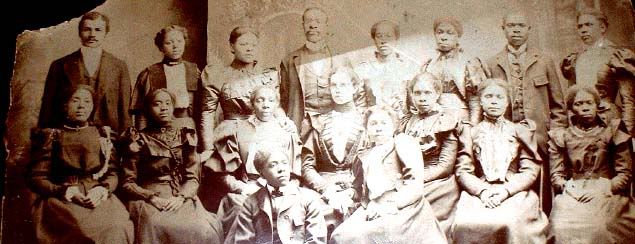
Neither Presley nor Millie were allowed to learn to read or write. They were obsessed with the idea that their children would not suffer the same fate. They worked long hard hours to make that dream come true.
Martha graduated from DC Teachers College. Joseph became a doctor, graduating from Howard University in 1907, James became a dentist, John a school teacher, and Henry a projectionist at a cinema.
Millie's brother Dennis Weaver, ran off from his owners to fight in the Civil War. He served in Company D, 1st Regiment, USCT.
According to : Black,Copper & Bright , The District of Columbia's Black Civil War Regiment, by C.R. Gibbs
Dennis Weaver is listed as Pvt., Co. D, joined at age 19, occupation , waiter, joined on 6/14/1863 at Mason's Island, Virginia and listed his birthplace as Alexandria, Virginia. Note: Masons Island has also been called Analostan Island, but is now known as Theodore Roosevelt Island, and is in the Potomac River across from Georgetown and the Kennedy Center in Washington, D.C. The Island was the camp of the 1st. Regt. The First Regiment had a distinguished record in battle at "Wilson's Wharf" (Fort Pocahontas), "Baylor's Farm" and others
After the war, he returned to Loudoun to marry Delia Fields, daughter of a free man of color and buy land.
From the History of Snickersville by Jean Harris:
On This mountain side, James Fields, a free negro, already had
bought land. Now it was to become a haven for those negroes who
were just becoming aware of the privilege of home ownership. One of
the first to buy was Benjamin Franklin Young, who bought 17 acres
from Dr. Plaster in 1871. Later that year, Dr. Plaster sold Dennis
Weaver 6 acres. Dennis Weaver built a house on this mountainside,
on the narrow road that bounds the Carrington house, winds past the
old school, and twists up behind the breastworks of the war that
brought freedom. Dennis and his wife Delia cleared the woods for
lawn and garden and from this house went back and forth to the
village - Dennis to help the farmers bring the scorched earth back to
productivity and Delia to care for countless of the households and
children. One of these children remembers today her spankings.
Aunt Delia cared for others until about 1923, when she herself
needed care...Delia Weaver lived until 1935 and now lies buried beside
Dennis, not on the mountain, but only a few miles away, looking back
to the village in which they lived in slavery and the home which they
built in freedom.
The land bought by Millie's brother Dennis, on that mountainside, is still in my family today, and I own 3 of those acres. I am named Denise for him, and for my other great grandfather.
What was life like for slaves in Loudoun? I am blessed to have the slave narrative of one of the member's of my family.
These narratives were collected in the 1930s as part of the Federal Writers' Project of the Works Progress Administration (WPA) and assembled and microfilmed in 1941 as the seventeen-volume Slave Narratives: A Folk History of Slavery in the United States from Interviews with Former Slaves.
http://lcweb2.loc.gov/...
George Jackson was the brother of Millie's brother-in-law Richard. Here are portions of his story:
I was born in Loudon County , Virginny, Feb., 6, 1858 . My mother's name was Betsy Jackson. My father's name was Henry Jackson. Dey were slaves and was born right der in Loudon County . I hed 16 brothers and sisters. All of dem is dead. My brothers were Henry, Richard, Fesley, John and me; Sisters were Annie, Marion, Sarah Jane, Elizabeth, Alice, Cecelia and Mary. Der were three other chillun dat died when babies.
I can remember Henry pullin' me out of de fire. I've got scars on my leg yet. He was sold out of de family to a man dat was Wesley McGuest. Afterwards my brother was taken sick with small-pox and died.
We lived on a big plantation right close to Bloomfield , Virginny. I was born in de storeroom close to massa 's home. It was called de weavin' room -- place where dey weaved cotton and yarn. My bed was like a little cradle bed and dey push it under de big bed at day time.
My grandfather died so my mother told me, when he was very old. My grandmother died when she bout 96. She went blind fore she died. Dey were all slaves.
My father was owned by John Butler and my grandmother was owned by Tommy Humphries. Dey were both farmers. My massa joined de war. He was killed right der where he lived.
When my father wanted to cum home he hed to get a permit from his massa . He would only cum home on Saturday. He worked on de next plantation joinin' us. all us chillun and my mother belonged to Massa Humphries.
I worked in de garden, hoein' weeds and don I was bed dishes in de kitchen, I never got any money.
I eat fat pork, corn bread, black molasses and hed milk. The meat was mostly boiled. I lived on fat meat and corn bread. I don't remember eatin' rabbit, possium or fish.
De slaves on our plantation did not own der own garden. Dey ate vegetables out of de big garden.
In hot weather I wore geans pants and shirt. De pants were red color and shirt white. I wore heavy woolen clothes in de winter. I wore little britches wid jacket fastened on. I went barefooted in de summer.
De mistress scold and beat me when I was pullin' weeds. Sometimes I pulled a cabbage stead of weed. She would jump me and beat me. I can remember cryin'. She told me she had to learn me to be careful. I remember the massa when he went to war. He was a picket in an apple tree. A Yankee soldier spied him and shot him out of de tree.
I remember Miss Ledig Humphries. She was a pretty girl and she had a sister Susie. She married a Mr. Chamlain who was overseer. Der were Robert and Herbert Humphries. Dey were older den me. Robert was about 15 years old when de war surrender.
De one that married Susie was de overseer. He was pretty rough. I don't remember any white neighbors round at dat time.
Der were 450 acres of de plantation. I can't remember all de slaves. I know der were 80, odd slaves.
Lots of mornings I would go out hours fore daylight and when it was cold my feet would 'most freeze. They all know dey had to get up in de mornin'. De slaves all worked hard and late at night.
I heard some say that the overseer would take dam to de barn. I remember Tom Lewis. When his massa sold him to our massa he told him not to let the overseer whip him. The overseer said he would whip him. One day Tom did something wrong. The overseer ordered him to de barn. Tom took his shirt off to get ready for de whippin' and when de overseer raised de whip Tom gave him one lick wid his fist and broke de overseer's neck.
Don de massa sold Tom to a man by de name of Joseph Fletcher. He stayed with old men Fletcher til he died.
Fore de slaves were sold dey were put in a cell place til next day when dey would be sold. Uncle Marshall and Douglas were sold and I remember dem handcuffed but I never saw dem on de auction block.
I never knew nothin' bout de Bible til after I Was free. I went to school bout three months. I was 19 or 20 years old den.
My uncle Bill heard dey were goin' to sell him and he run away. He went north and cum back after de surrender. He died in Bluemont, Virginny, bout four years ago.
...
When slaves were sick one of the mammies would look after dem and dey would call de doctor if she couldn't fix de sick.
I remember de big battle dey fought for four deys on de plantation. That was de battle of Bull Run. I heard shootin' and saw soldiers shot down. It was one of de worst fights of de war. It was right between BludRidge and Bull Run mountain. De smoke from de shootin' was just like a fog. I saw horses and men runin' to de fight and men shot off de horses. I heard de cannon rear and saw de locust tree cut off in de yard. Some of de bullets smashed de house. De apple tree where my massa was shot from was in de orchard not far from de house.
De Union Soldiers won de battle and dey camped right by de house. Dey helped demselves to de chickens and cut their heads off wid their swords. Dey broke into de cellar and took wine and preserves.
After de war I worked in de cornfield. Dey pay my mother for me in food and clothes. But dey paid my mother money for workin' in de kitchen.
De slaves were awful glad bout de surrender.
De Klu Klux Klan, we called dem de paroles, dey would run de colored people, who were out late, back home. I know no school or church or land for negroes.
My other great grandfather Dennis Williams was a freeman of color in Fauquier and later Loudoun county in the 1850's. He was apprenticed as a stonemason as a child, and later became a farmer.
We will never learn who his white father was; his mother was a slave on the Carter plantation. He also could not read or write.
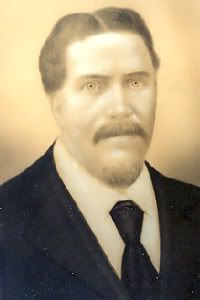
His daughter, Louella, my grandmother married Dennis Roberts.
These children of slaves, learned to read, worked hard and built their communities; teaching, healing, building a better world for their children and grandchildren.
But education was not enough. It did not change the color of our skin.
It did not allow us equal opportunity. We were still not free.
Only 3 African-American's have served in the Senate since reconstruction.
As a child from the Jim Crow era, who still remembers life before the Civil Rights Act, I never thought I'd live to see the day when a black man would have the chance to be President of this nation which my ancestors slaved in, and worked to build.
I am angered when I hear Northern Virginia disparaged as "not part of REAL America." My family history is an American reality.
I will be heading in the spring down to Virginia, to the quiet little cemetery of Rock Hill, to plant a rose bush in memory of this day.
They are buried there, my kin. They are the roots of my tree. Silent, but not forgotten.
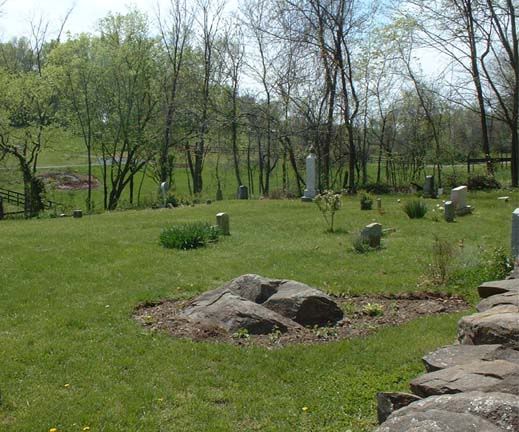
I thank all of you who will cast a vote today in VA.
I thank all of you, no matter where you are, for working, and voting and for making this day possible.
I'm headed off to school in about an hour. I cast my vote here in New York at 6AM. I will watch as 5,000 students on my campus vote, many for the first time.
No matter the outcome. We have won.


